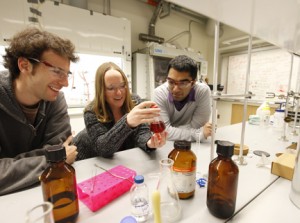By Dan Edelen
As her research on using solar energy to synthesize new fuels garners accolades, Christine Thomas ’01 is also focused on the accomplishments of her students.

Christine Thomas '01 (center) works with her research students Benjy Cooper '11 (left) and Usman Hameedi '12. Photo courtesy Mike Lovett/Brandeis University
Thomas, assistant professor of chemistry, Brandeis University, is a recipient of the prestigious Alfred P. Sloan Fellowship, which annually recognizes about 100 early-career scientists whose achievements and potential identify them as rising stars, the next generation of scientific leaders. She also was featured on the April 4 NOVA special “Hunting the Elements,” focused on the elements of life, such as oxygen, carbon, and hydrogen.
A chemistry graduate and Lafayette legacy (father, John ’70; grandfather, Edward ’31; uncle, William ’58), Thomas first glimpsed her future career while conducting research with Chip Nataro, associate professor of chemistry. The pair collaborated on an investigation into the synthesis and electrochemistry of inorganic complexes.
“With his explanations and techniques, Chip brought the classroom experience into the laboratory,” says Thomas, who was the student speaker at the dedication of Lafayette’s Hugel Science Center in 2000. “After working in his lab, I realized I wanted to be like Chip someday. I wanted to run a research lab. I wanted to teach. I wanted the whole thing.”
Thomas completed her doctorate in inorganic chemistry at California Institute of Technology, where as a graduate teaching assistant she won the 2006 award for excellence in teaching. She completed postdoctoral research under professors Marcetta Darensbourg and Michael Hall at Texas A&M University. She participated in work to mimic an enzyme that produces hydrogen—an alternative to fossil fuels.
For her first teaching assignment, Thomas looked for a small liberal arts college that, like Lafayette, had significant research opportunities. Her search took her to Brandeis.
“It’s small enough that you really get to know and build relationships with most of the undergraduate chemistry majors. But at the same time, I have had all of the resources I need to build and maintain a renowned research program,” she says.
In her laboratory, Thomas and a team of 20 postdoctoral, graduate, and undergraduates are synthesizing “new ligands and transition metal complexes with the ultimate goal of uncovering new approaches to the catalytic activation and functionalization of small molecules and organic substrates,” she says. “These types of processes are critical for the development of sustainable energy technology and for the catalysis of organic transformations.”
Teaching gives Thomas the feeling that she’s making a difference in someone’s life.
“In the future, we’re going to need another generation of scientists who are just as excited and just as motivated and can use new knowledge to make the same sort of strides forward,” she says. “That’s the best contribution I can make.”

2 Comments
Chris’ great grandfathers also graduated from Lafayette: William Hughes 1901 and Ralph Thomas 1906.
Comments are closed.